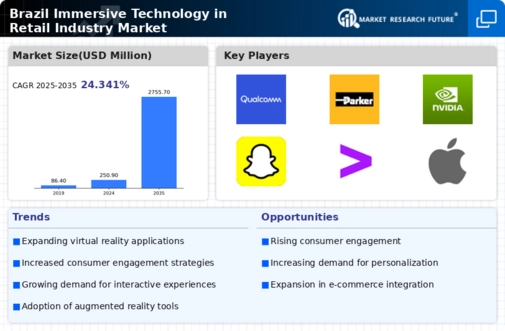Changing Consumer Preferences
Consumer preferences in Brazil are shifting towards more interactive and engaging shopping experiences, driving the immersive technology-in-retail-industry market. Brazilian shoppers are increasingly seeking personalized and memorable interactions with brands. This shift is evidenced by a survey indicating that 65% of consumers prefer retailers that offer immersive experiences. Retailers are responding by integrating immersive technologies to meet these evolving expectations. The desire for unique shopping experiences is prompting businesses to explore AR and VR solutions, which can enhance product visualization and storytelling. As these preferences continue to evolve, the immersive technology-in-retail-industry market is expected to expand significantly.
Investment in Retail Infrastructure
Investment in retail infrastructure in Brazil is a crucial driver for the immersive technology-in-retail-industry market. As retailers modernize their physical spaces, there is a growing emphasis on incorporating immersive technologies to enhance customer experiences. This trend is supported by government initiatives aimed at boosting the retail sector, which have led to increased funding for technological upgrades. Reports indicate that investments in immersive technology can yield a return on investment (ROI) of up to 150% through improved customer engagement and sales. As infrastructure improves, the potential for immersive technology to transform retail experiences in Brazil is likely to expand.
Competitive Pressure Among Retailers
Intense competition within the Brazilian retail sector is a significant driver for the immersive technology-in-retail-industry market. Retailers are striving to differentiate themselves in a crowded marketplace, leading to increased investments in immersive technologies. Companies that adopt AR and VR solutions are likely to gain a competitive edge by offering unique shopping experiences that attract consumers. A recent analysis suggests that retailers utilizing immersive technology can see a 20% increase in foot traffic and sales. As competition intensifies, the pressure to innovate and enhance customer engagement through immersive experiences will likely propel the growth of the market.
Technological Advancements in Retail
The rapid evolution of technology is a primary driver for the immersive technology-in-retail-industry market. In Brazil, advancements in augmented reality (AR) and virtual reality (VR) are reshaping the shopping experience. Retailers are increasingly adopting these technologies to create engaging environments that captivate consumers. For instance, AR applications allow customers to visualize products in their own space before making a purchase. This trend is reflected in a reported increase of 30% in customer satisfaction when using immersive experiences. As Brazilian consumers become more tech-savvy, the demand for innovative shopping solutions is likely to grow, pushing retailers to invest in immersive technologies.
Rise of E-commerce and Omnichannel Strategies
The growth of e-commerce in Brazil is influencing the immersive technology-in-retail-industry market. As online shopping becomes more prevalent, retailers are adopting omnichannel strategies that integrate physical and digital experiences. Immersive technologies, such as virtual showrooms and AR applications, are being utilized to bridge the gap between online and offline shopping. This integration is crucial, as studies indicate that 75% of consumers prefer a seamless shopping experience across channels. Retailers are leveraging immersive technology to enhance product discovery and engagement, thereby driving growth in the market. The ongoing evolution of e-commerce is expected to further stimulate the adoption of immersive solutions.
















